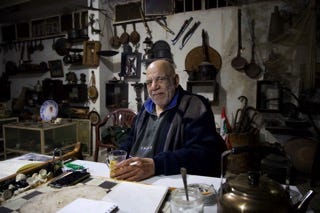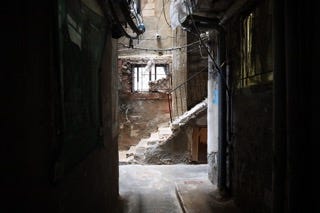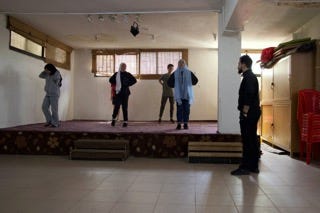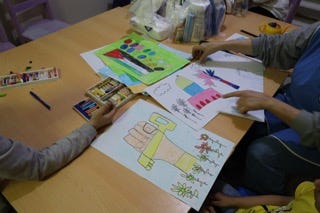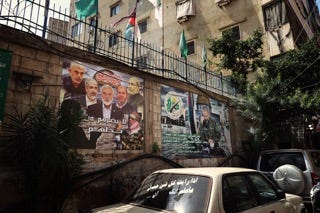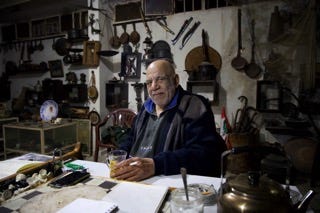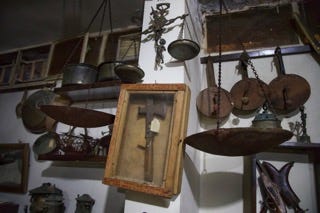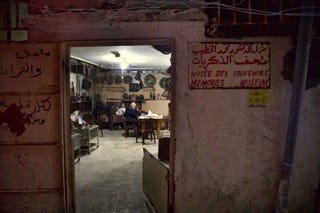Walking the streets of Shatila scattered with memories of Palestine
The impoverished Palestinian refugee camp in southern Beirut is full of small groups preserving memories and culture Palestine
The markets were crowded when I walked through Shatila, a decades old Palestinian refugee camp in southern Beirut last week.
It was late afternoon.
Shortly, those observing the holy month of Ramadan will break their fast with an evening iftar. Butchers and bakeries are busy with people buying meats and sweet treats for the special dinner while dodging the motorbikes that weave in and out of the crowded street.
In recent decades, the growing population of Shatila has become less Palestinian. Refugees who fled the civil war in neighbouring Syria now also call this place home. Along the main road, shops sell South Asian foods for migrant workers from Sri Lanka, India and Bangladesh attracted to the low rents available in this impoverished Beirut neighbourhood. Other shops sell hair treatment and offer braiding for the Ethiopian and Nigerian women who have come to Lebanon searching - but often not finding - a better life.
Today, Shatila is made up of a labyrinthine web of narrow streets edged by towering concrete buildings. Floors are continuously added to buildings to accommodate the camp's growing population. The vertical and often dangerous construction means there’s a lack of sunlight and open space.
A dance rehearsal is takes placing in a Palestinian community centre improbably squeezed between Shatila’s narrow alleyway and run by the NGO Beit Atfal Assomoud (The House of Resilient Children).
On the top floor, a small troupe of Palestinian boys and girls kick their feet in unison before turning and clapping their hands to the music’s beat. The rhythmic steps of Dabkeh are counted out by their instructor Mohammad Abdel Latif Al-Hajj, who learnt the traditional Palestinian folk dance from his late father while growing up in Shatila refugee camp in southern Beirut. “Dabkeh reminds these children that Palestine is still alive,” says Al-Hajj.
The Beit Atfal Assomoud centre provides social services and a kindergarten. One classroom displays a poster with the date in 1917 when the British foreign secretary Arthur Balfour promised support for “the establishment in Palestine of a national home for the Jewish people”, which has become a day of protest for Palestinians. In another room a girl colours Al-Aqsa Mosque in East Jerusalem, while a younger boy draws a large key. Old Ottoman keys are a common Palestinian symbol for the right of return for some 700,000 Palestinians and their descendants who were displaced from their homes in 1948 when the state of Israel was formed. “The children need to learn why the Palestinians are here in Lebanon,” says Ashwak Ashabbi, one of the centre’s social workers.
An estimated 210,000 Palestinian refugees live in a network of ghettoised camps in Lebanon run by the UN agency Unrwa. Security within the impoverished camps is provided by Palestinian factions and committees rather than Lebanese security forces. The secular-leaning Fatah party has traditionally dominated camp governance but support for its Islamist rival Hamas has grown since the 7th October when the group launched a surprise attack in southern Israel last October, killing some 1,200 and taking over 200 hostages.
Fresh posters featuring Hamas leaders Yahya Sinwar and Ismael Haniyeh hang on display in Shatila, alongside the faded yellow flags of Fatah and faces of the late Palestinian leader Yasser Arafat and his unpopular successor Mahmoud Abbas.
Since Unrwa’s funding was cut after Israel alleged that its staff were involved in the 7th October attack (a claim which the EU humanitarian chief says is not backed up by evidence), cash-strapped Fatah has had diminishing influence over limited jobs and resources in the camps.
Meanwhile, Hamas offers fighters in Lebanon a small monthly salary and a quixotic promise of military victory over Israeli forces, which have so far killed over 33,000 Palestinians during their latest campaign in Gaza. “Fatah has been very quiet in the camp since the war began,” says Muhammad Al-Khatib (76). “I’m not a member of either party or a believer, but Hamas are fighting for their freedom - how can how can we speak out against them?”
Born in Al-Khalisa in the dying gasps of British Mandate Palestine, Al-Khatib was a baby when his family fled to Lebanon in 1948. He says his family home is still standing but is now inhabited by an Israeli family. After qualifying as a doctor in Spain, Al-Khatib worked for Unrwa in Shatila (Palestinians are not allowed to work in Lebanese hospitals) - “I think I picked medicine by mistake, as my mind always goes to literature.”
Now retired, Al-Khatib runs the Museum of Memories in Shatila where in one modest room he has gathered items that Palestinians carried with them as they fled from Palestine to Lebanon in 1948. The generator cuts sporadically as he describes the different artefacts - coffee grinders, musical instruments, saws - and shows photographs of Palestinian life before 1948. “They want to think nothing existed there before Israel,” he says.
Occasionally tourists from Spain, China and Ireland visit the museum. There’s a small donations box but other than that Muhammad receives no funding for the little Museum of Memories.
Some of the objects are incrusted with a layer of salt because the museum lacks a dehumidifier to help preserve the historic items from the heavy humid air. An axe hangs in a box on one wall. Muhammad says it was used in the massacre at Shatila in 1982 when hundreds of Palestinians were murdered by Israeli-backed Christian militias.
Even before the 7th October attack, a Palestinian right of return was widely viewed in Israel as an existential threat to the state’s Jewish character and majority. Since then Israeli government has repeated its calls for Unrwa to stop granting new generations of Palestinians refugee status and for host countries to instead fully integrate them with full citizenship. Underpinned by a fragile sectarian powersharing arrangement, Lebanon’s political system has already excluded Palestinian refugees from the majority of professions in Lebanon and even owning property. Outside of marriage and old-fashioned corruption, Palestinians in Lebanon know securing Lebanese citizenship is unlikely.
In the event of a future political resolution to the decades-long conflict, the Israeli government may allow a symbolic number of Palestinian refugees to return to Israel. A larger number could have the option to return to whatever shrinking territory remains for a Palestinian state in the West Bank and Gaza. But, in his room of memories beside a table with old keys to homes that Palestinian families left behind, 76-year-old Al-Khatib says he only wants to go home to Al-Khalisa.

